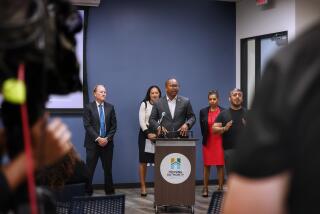Rich and Poor Alike Deserve Health Care
- Share via
Orange County is proud of all the surveys that show how economically sound it has become and what a wonderful and desirable place it is to live and work.
But the report published last Tuesday in the American Journal of Medicine detailing the serious shortcomings of health care for the poor in Orange County is no cause for pride. Nor can it be dismissed as something affecting only a few people.
The figures and findings are cause for concern in any community, but more so in ours because it is so prosperous--just too well off to simply ignore the 17% of the county’s population living in households with incomes below the national poverty level.
The study of northern Orange County residents done by UC Irvine researchers for St. Jude Hospital found that 37% of the poor who were surveyed lack medical insurance and consequently fail to get the basic medical care that other residents with money or insurance take for granted. The proportion is far above the national average of 27%. One of the scientific study’s principal authors, Dr. F. Allen Hubbell, concluded that “the indigent care system in Orange County is in a crisis.”
This is not the first warning about a care system whose deterioration is of vital concern to all residents, not just to the poor and the uninsured. The lack of regular medical care puts an added strain on emergency rooms, which could force some hospitals to curtail or end those services, creating a shortage felt by rich and poor alike.
The financial plight of the UCI Medical Center is well known, and in recent budget hearings before the County Board of Supervisors, health-care experts and doctors warned that the county’s emergency-care system is near collapse and that the ability of the medical community to continue to offer care is near the breaking point.
The state and federal governments are shortchanging the county, but county officials are also shortchanging residents. Despite the county’s prosperity and all the increases in local tax revenues from rising property values, county officials spend less per capita for indigent medical care than do all but two of the state’s 58 counties.
And the portion of the county budget for welfare and health-care payments to the poor has dropped in the past 11 years from 32% to just 19%. In addition, funding for health-care programs grew only 16% during the past two years, while budgets have grown as much as 228%.
The health-care crisis is a national problem, but that doesn’t mean that more can’t be done locally. The UCI researchers didn’t just diagnose the county’s health-care ills. They also prescribed treatments, recommending more accessible health care--especially prenatal care--and more educational programs emphasizing preventive care.
St. Jude Hospital responded by leasing a van to take medical services into areas whose residents do not receive adequate care. It also has started an education program and plans to support several health clinics.
Others should also respond. County and state officials cannot just cluck about survey reports and go on doing nothing, hiding behind the oft-repeated and convenient excuse that there isn’t enough money.
Some things--such as health care--must be provided, and the funds must be found. Medical care must be available for all, not just for people with money or insurance. The reports on the deteriorating health- and emergency-care system in Orange County provide disturbing documentation that when it comes to the health of the less affluent, there is far too little curing--or caring.
More to Read
Sign up for Essential California
The most important California stories and recommendations in your inbox every morning.
You may occasionally receive promotional content from the Los Angeles Times.




![Vista, California-Apri 2, 2025-Hours after undergoing dental surgery a 9-year-old girl was found unresponsive in her home, officials are investigating what caused her death. On March 18, Silvanna Moreno was placed under anesthesia for a dental surgery at Dreamtime Dentistry, a dental facility that "strive[s] to be the premier office for sedation dentistry in Vitsa, CA. (Google Maps)](https://ca-times.brightspotcdn.com/dims4/default/07a58b2/2147483647/strip/true/crop/2016x1344+29+0/resize/840x560!/quality/75/?url=https%3A%2F%2Fcalifornia-times-brightspot.s3.amazonaws.com%2F78%2Ffd%2F9bbf9b62489fa209f9c67df2e472%2Fla-me-dreamtime-dentist-01.jpg)








